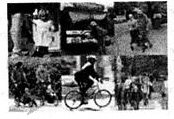题目内容
 For the past two decades.
For the past two decades.
As a New Yorker who has spent two years researching roads and transportation across the United States, 1 am saddened lo see our city falling behind places like downtown Albuquerque, where one-way streets have become more pedestrian-friendly two-way streets, and car lanes are replaced by bike lanes, with bike racks everywhere. Then there is Grand Rapids, Midi. , which has a walk-able downtown with purposely limited parking and is home to a new bus square. In Indianapolis, an urban walking and biking road will soon link inner-city neighborhoods something
We have lost our golden pedestrian touch in New York mostly because we still think about traffic as though it were 1950, and we needed Robert Moses to plow a few giant freeways through town to get the cars moving again. But the fact is that more roads equal more traffic. New Yorkers always find good reasons to drive. Public transportation is dirty, time-consuming, unsafe. Walking takes too long. The children will be late for school. But choosing the car is no longer safe ― for your children who already don’t get enough exercise, for anyone’s lungs or for the future of
72.According to ihe passage, New York _____.
A.used to be a good example for other cities to follow in road design
B.is still an inspiration to other American cities in city design
C.used to have a lot of crimes and the city was too crowded with cars
D.is learning from the rest of
73.It can be inferred from the passage that______.
A.
B.in Albuuuerque, the streets have become one-way streets
C.the city of
D.parking is not allowed in the center of
74.The cause of the present traffic situation in New York is that ______.
A.New Yorkers prefer driving to walking or taking buses
B.taking buses lakes a long lime and is not safe and clean
C.the more roads there are, the more traffic there will be
D.the city of
75.The author of the passage suggests that ______.
A.more freeways be built to get the cars moving again
B.
C.children in New- York schools should walk to schools
D.New Yorkers should replace their cars with bicycles
ACAB

 名校名师培优作业本加核心试卷系列答案
名校名师培优作业本加核心试卷系列答案 全程金卷系列答案
全程金卷系列答案My father is a smart man. He spent many years of his life listening to people’s arguments, first as assistant district lawyer and then as a judge. My dad knows rubbish rhetoric when he hears it.
One of his favorite phrases is: “If you don’t have anything smart to say, then don’t say it at all.” Yet, for all of his legal training and life experience, he can’t help but keep talking about the Mega Millions jackpot.
We all know the odds(几率)of winning the jackpot this evening with one ticket are extraordinarily low ... 1 in 175, 711, 536, to be exact. Still, people go out and buy hundreds of tickets with the hopes of becoming wealthier beyond their dreams. Why? There are two possible explanations for this “irrationality”(不理智).
One idea is that the way we calculate odds in our heads has nothing to do with mathematical odds in the traditional sense. We don’t go to the mathematical odds table and say, “Well, this would be a terrible investment. I think I’m better off putting my money in the bank!” Rather, it has everything with the ability to picture an event happening.
My father, for instance, watches the news every night and sees people winning the lottery(彩票). Therefore, he thinks the chance of him winning the lottery is much higher than they actually are.
The second thought is that the expected effect of playing cannot be represented merely by the odds. My father and, I’m sure, others get a thrill from the mere idea of winning. He loves imagining what it would be like to actually win and losing doesn’t really affect him. Sure, he’s disappointed, but it’s “better to have loved and lost than never to have loved at all.” When you combine the utility of thinking you can win with the utility of actually winning (no matter how small the chance of that occurring), it’s worth it for many people to spend the one dollar on a ticket.
My analysis is that both factors are at play in taking a chance on the lottery. My father and others really do underestimate the odds of winning, but the thrill of participation is not denied by a realistic assessment of the odds. Still, I would probably put my finger on the scale for the first explanation.
All told, a review of the odds of other events happening confirms that there just aren’t many events that occur with less frequency than your winning the Mega Millions jackpot. Look at the graph below, you may understand some:
In many ways, it’s like the lottery, something that features often on television and about which people fantasize, but that rarely happens.
So, when you watch, along with my Pa, to see if your lucky number is drawn this evening, keep in mind three things: that your number almost certainly won’t come up; that you are still going to have fun; and that, finally, a lot of other things are more likely to happen—but getting eaten by a shark isn’t one of them.
【小题1】It can be learned from the article that ________.
| A.the Mega Millions jackpot is the last lottery to win in the world |
| B.a judge in that country can’t talk about lottery because it is illegal |
| C.the writer doesn’t buy lottery, for he never hopes to become rich |
| D.In spite of little possibility, a lot of people spend money on lottery |
| A.show chances that those things take place are fewer |
| B.support the writer’s arguments on the lottery tickets |
| C.indicate no one can win the Mega Millions jackpot |
| D.say shark attack death will seldom happen this year |
| A.If one has mathematical odds, he can win the prize more easily. |
| B.Only those who have irrationality buy hundreds of lottery tickets. |
| C.The Mega Millions jackpot is very popular in the writer’s country. |
| D.Winning lottery is a shortcut to achieve the dream of being rich. |
| A.effective | B.ridiculous | C.contradictory | D.astonishing |
| A.The Popular Mega Millions Jackpot | B.Lottery is Merely a Trick |
| C.Mega Million is Like a Shark Attack | D.Be rich, Buy Lottery Soon |